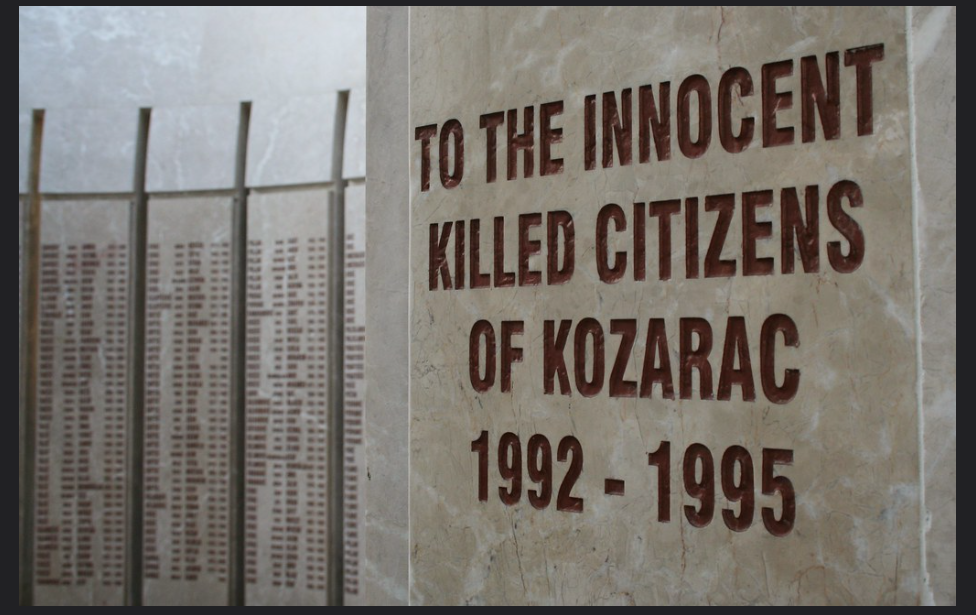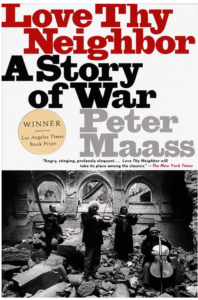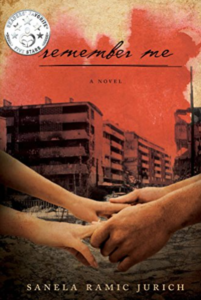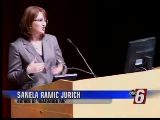“The initial takeover included the attack on the town of Kozarac near Prijedor, on 24 May 1992, which included two days of artillery barrage and an assault by a mechanised brigade of troops. As a result, some 800 civilians out of a population of around 4,000 were killed.” ~Source

This time of year always brings up feelings of fear, overwhelming sadness, and a sense of not being wanted in the world or in life in general.
I witnessed the most horrible things happening to my family, friends, neighbors, and ultimately to me… I survived, but many didn’t.
The year was 1992. It felt like hell on earth. In Europe, in a country called Yugoslavia, in a smaller place called Bosnia, and an even smaller town called Prijedor with its surrounding municipalities, everything was being torn apart. People I loved were consumed by evil: murder, torture, concentration and rape camps… Why?
This year marks thirty-two years since the attack on Kozarac.
I would like to share an excerpt from a book called Love Thy Neighbor: A Story of War by Peter Maass (An American Journalist).
I highly recommend this book. It is the first book I have read on the subject that describes Bosnia and Croatia in 1992 and 1993 exactly as they were, exactly how I saw it, but from a foreign person’s perspective.
Peter Maass worked as a foreign correspondent from 1983 to 1995, based in Asia and Europe. His articles have appeared in the Washington Post, The New York Times, the Wall Street Journal, and The New Republic. His wartime dispatches from the Balkans led to his selection as a finalist for the 1993 Livingston Award for International Reporting. He is currently a magazine writer and lives in New York City.
Nationalist Serbs staged a nighttime coup to take over (my town) Prijedor. There wasn’t much fighting because the Serbs were well armed and there was no resistance to speak of. No one else was prepared for war. The man named Kovacevic organized the takeover.
In this excerpt, Peter Maass talks about the attack on Kozarac.
 …After most of Prijedor’s Muslim men were shipped to prison camps, the cleansing campaign focused on cracking a final nut called Kozarac, a town of 25,000 people, mostly Muslims, just six miles down the road. The cleansing of Kozarac turned into one of the most vicious campaigns of civillian slaughter in the entire war.
…After most of Prijedor’s Muslim men were shipped to prison camps, the cleansing campaign focused on cracking a final nut called Kozarac, a town of 25,000 people, mostly Muslims, just six miles down the road. The cleansing of Kozarac turned into one of the most vicious campaigns of civillian slaughter in the entire war.
The shelling began on May 24 after Kozarac had been surrounded by Serb tanks. Up to fifteen shells hit the town every minute from twelve directions. After a few hours, the shelling stopped and the Serbs used loudspeakers to tell the people of Kozarac that they would not be harmed if they left their basements and surrendeered. The people complied, and almost as soon as the streets filled up with surrendering Muslims, the shelling resumed. It was a trick, and the street became littered with severed limbs and human gore. The survivors fled back to their basements or into the hills. After two days of continued bombardments, another order to surrender was issued, and the Muslims of Kozarac complied once more.
This time, the Serbs played a differnet trick. As Korarac’s beaten population filed down the main road toward the soccer stadium, one of the Serbs who lived in the town stood on a balcony and pointed out every important Muslim–the mayor, police chief, doctors, lawyers, judges, businessmen, even spors heroes. Most were shot on the spot by Serb soldiers or taken to a nearby house where their throats were slit. One man had his legs tied to a tank that dragged him throgh town. He was finished off when the tank ran over him. It was a scene out of Schindler’s List, except this was no movie, and until Steven Spielberg makes a movie about it, few Americans will know, or believe, that it happened. This was elicide, the systematic killing of a community’s political and economic leadership so that the community could not regenerate. At least 2,500 civilians were killed in Kozarac in a seventy-two-hour period. It was a slaughterhouse. The survivors were sent to the prison camps…
End of excerpt.
Love Thy Neighbor: A Story of War by Peter Maass can be found on Amazon.
And now an excerpt from my book, Remember Me.
 …We all decided to walk to Kozarac and surrender to Serb forces. Columns of people moved through town in order to submit. Some older people and children got on busses, while the rest of us proceeded on foot. Armed Serb soldiers waited by an old tin factory and ordered everyone off the busses. Then they handed us bags to put all our possessions in. I had a golden necklace my parents bought for my birthday, and on it as a charm was my father’s wedding band that Mother had given me as we’d parted.
…We all decided to walk to Kozarac and surrender to Serb forces. Columns of people moved through town in order to submit. Some older people and children got on busses, while the rest of us proceeded on foot. Armed Serb soldiers waited by an old tin factory and ordered everyone off the busses. Then they handed us bags to put all our possessions in. I had a golden necklace my parents bought for my birthday, and on it as a charm was my father’s wedding band that Mother had given me as we’d parted.
My heart broke as I took it off my neck and placed it into the bag.
“Selma, look!” Kemal whispered, nudging me with his elbow. “That’s Dule…Dule Djukic. Remember him? He went to school with me, and I brought him over to your house for lunch once, remember?” He formed a small smile. “Don’t worry, he’ll help us.”
I did remember a cute, dark-haired boy who came over with Kemal once and I was relieved to see this shy, polite person, who now wore an army uniform, coming our way.
“Good day, Dule. How are you?” Kemal started, extending his hand.
“You are not to address me by my first name, you damned Balia!” Dule yelled, hitting Kemal on the head with the back of a very large knife. Kemal fell to the ground and blood slowly creeped out of his left ear. We all started toward him, but two other soldiers joined Dule, and three others ordered us to move back or we’d all be shot. We did as ordered, while they proceeded to kick Kemal, who was lying down on his stomach, crying in pain, and lifting up his arms trying to protect his head from the angry soldiers’ boots. Tears rolled down my cheeks as I heard Kemal’s mother wailing and screaming frantically. Her husband was holding her arms so she wouldn’t run to Kemal and get shot. He was crying also. Other soldiers, the ones that held us at gun point, were laughing, and one of them told my aunt: “Go ahead, join him so we can cut your and the rest of your family’s throats out too!”
Kemal was bleeding all over now. His black leather jacket was swimming in dark blood. At some point I heard him whimper out, “Dule, brother…why? Please tell me how I have wronged you…please…” But Dule just kept kicking until Kemal didn’t move any longer. They had beaten him to death.
“They killed my son!” Uncle Mehmed whimpered out. “They killed my only son!” Kemal’s father was shaking uncontrollably; he said those words as in disbelief, like the thought had never occurred to him before that they would actually kill Kemal. He wouldn’t move when they ordered us to get on the bus. He just stood there, shaking and sobbing. Lifting up his hands to hold his own head, he fell to his knees. “They killed him; they killed him…” were his last words before Dule came up behind and shot him in the head as a lesson to the rest of us.
They separated young girls from older women. Suada had two children with her, so by some miracle, they let her stay with them and her mother. They were transported to Trnopolje. The rest of us were transported to the Omarska camp.
End of excerpt.
My book, Remember Me, can be purchased from Amazon.
Why am I still writing about this? After 32 years, it feels like I’m still writing and talking about it as if it just happened. As if we don’t have other wars in the world to worry about. We do, and I am sorry for those innocent people (especially children) dying, but every time someone mentions war—any war anywhere in the world—I find myself back here. In this town in Europe, in 1992. I can’t escape it, and I’m furious that more people don’t know about it. Lots of people don’t believe me when I try to confide in them, when I tell them how the war “truly” is. Some even make fun of me, try to downplay it or justify it in some way. Every time I mention I’m from former Yugoslavia, I get questions like, “So what are you? Are you a Croat or a Serb, or”—God forbid—”a Muslim?!” As if being a Muslim makes you less of a victim, more deserving of the suffering.
I usually reply, “I’m a human being.” I let them wonder. They can’t tell the difference just by looking at me, as we are all the same race, the same ethnicity: White, Slavs. Religion is the hell you were born into and a “reason” for someone to hate, persecute, torture, or rape you. It’s an excuse for evil men to claim they have the right to be on this earth and you don’t.
That’s it from me for now. Thank you for your support by purchasing and reading my books.
With all my love,
Sanela

About the author

